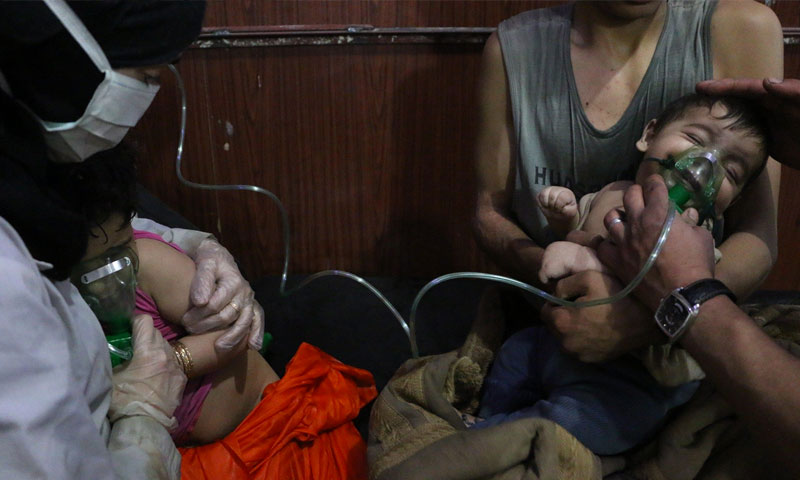Following a ten days truce in the city of Duma, the opposition’s last strongholds in Eastern Ghouta, Assad’s forces and their Russian allies targeted the area with military aircraft, using poisonous gas once more, amidst talks about the negotiations, concerning the city’s fate, as reaching a dead end.
Official media outlets justified the shelling by reporting that “Jaysh al-Islam” has obstructed the Duma agreement; “it bombarded civilians at the al-Wafddien Camp Crossing and in Dahiyat al-Assad and refused to release the kidnapped people.”
Gases Burry the Victims in their Shelters
In a new attack with poisonous gas, on Saturday April 7, 75 people were killed, and hundreds were affected, according to the Ghouta Media Center.
The Directorate of the “Civil Defense” in Damascus and its countryside reported that over a hundred civilians, including women and children, suffered suffocation due to targeting the Duma residential neighborhoods with poisonous gases, the type of which was not identified.
According to the Directorate, entire families have died due to suffocation in the basements, explaining that the source of the gas is a container dropped by Assad’s forces affiliate aircraft.
According to medical sources in Ghouta, the symptoms that showed on the victims resemble those relating to the chemical massacre of August 2013.
For its turn the Official News Agency (SANA) described the Duma attack “as a play to save terrorists there” and quoted an official source saying that “Jaysh al-Islam terrorists are in a state of frustration, and their media representatives are reusing the chemical-based fabrications in a failed and exposed experimentation to hinder the [Syrian]army’s progress.”
In addition to the poisonous gas attack’s victims, other 47 civilians died on Saturday and Friday, after Assad’s forces have continued their air raids and ground attacks to storm the city from the western and northern sides.
In sync, seven people, at least, were killed and 40 others were injured in a missile attack on Damascus, which media outlets attributed to the “armed men of Jaysh al-Islam”.
The official spokesman of “Jaysh al-Islam’s” Joint Chiefs of Staff, Hamza Bairqdar, denied targeting the capital Damascus or its neighborhoods and accused Assad’s forces of the shelling “in the frame of justifying the ferocious attack on the city of Duma in Eastern Ghouta,” and of violating the ceasefire agreement that resulted from the negotiations.
The Syrian regime threatened the faction, in control of the opposition’s last strongholds in Eastern Ghouta that it will resort to “military resolutions” in case it refused to release the kidnapped.
The official Syrian television reported that “the military operations’ leader’s decision in Ghouta became evident, either releasing the kidnapped entirely or decisive finalizations and crushing the terrorist’s positions in Duma”.
Ambiguous Negotiations Reach a Dead End
Ambiguity circles the negotiations between Russia and “Jaysh al-Islam” faction, for the latter is hiding what is happening at the negotiations’ table. Under what appeared as the implementation of the provisions of an agreement between the two sides, the Syrian regime, on Wednesday March 4, received all the people who the faction was keeping.
“SANA” Agency said that the agreement provides for the departure of “Jaysh al-Islam” from the city of Duma to Jarabulus in Northern Aleppo and the legalization of the status of the people who wish to stay in the area, as well as the return of all the government’s departments to the city.
However, the Director of the Faction’s External Political Office Mohammad Aloush denied arriving at an agreement with Russia concerning Duma, confirming to Enab Baladi that “a step to evacuate the humanitarian cases is being undertaken; only this step has been done,” without adding any further details.
Chemicals or Identification with the Russians
Sources told Enab Baladi that the Russian side have delivered its proposal to “Jaysh al-Islam,” on Friday, via Colonel Alexander Zorin, who led the negotiations with the “al-Rahman Legion” faction in the middle sector of Ghouta. The Russian side’s proposal provides for surrendering heavy weapons to the Syrian regime in a duration that does not exceeded three days, while Russia would guarantee that the regime would not use military aircraft. The faction has also to give up its light weapons within a week under Assad’s forces guaranteed departure from the area.
The proposal also provides for the legalization of the status of all those who surrendered their weapons and applied for volunteering in the police, on the condition that the police is to be formed in two weeks.
The formed police would receive funding from Russia to fight against the “Islamic State” (ISIS) and “al-Nusra Front”, in addition to the spread of the Russian police at the area’s checkpoints.
A committee, affiliate to Rural Damascus Governorate, will hold the responsibility for solving all the city’s suspended issues at an administrative level. The civilians would be given the chance to legalize their status with issuing a deferment for the people who are at the age of “military service”, with Russian guarantees that the Syrian regime’s army or intelligence services would not interfere in the people’s affairs, providing that all the kidnapped people be released.
According to the source, the Russian side has specified a time limit for the faction, to 8 a.m. on Friday 7th of April.
Enab Baladi could not have a confirmation of “Jaysh al-Islam’s” response to the Russian proposal. But Aloush, in a television interview with “al-Hadath” Channel, on Friday, said that “the faction does not want to close the door in the face of the negotiations with Russia, seeking to reach a peaceful reconciliation concerning the city of Duma,” adding that, “we are defending ourselves, and we are still calling for setting at the negotiations’ table to reach a logical and fair solution, which leads to protect civilians from bloodshed.”

